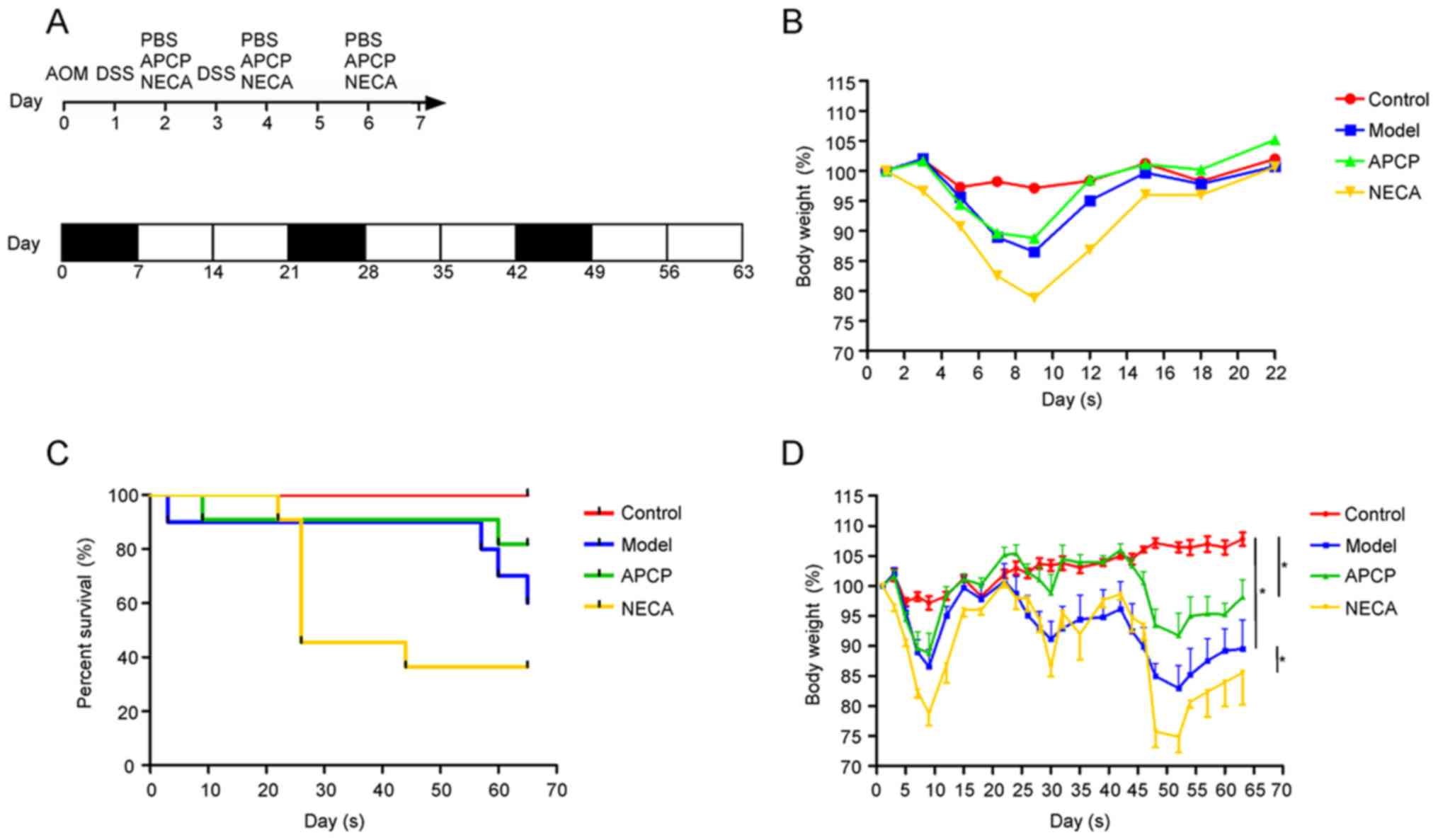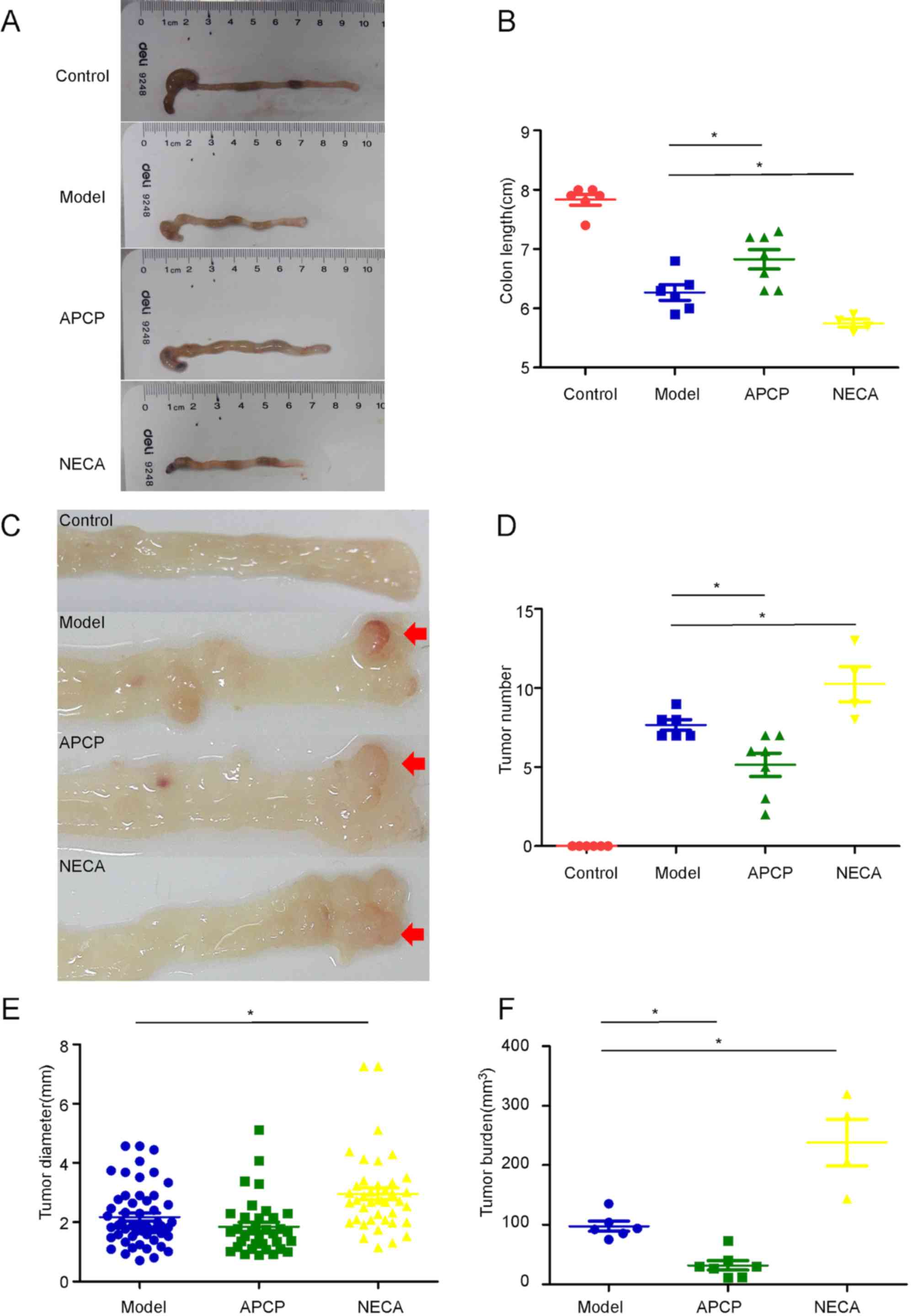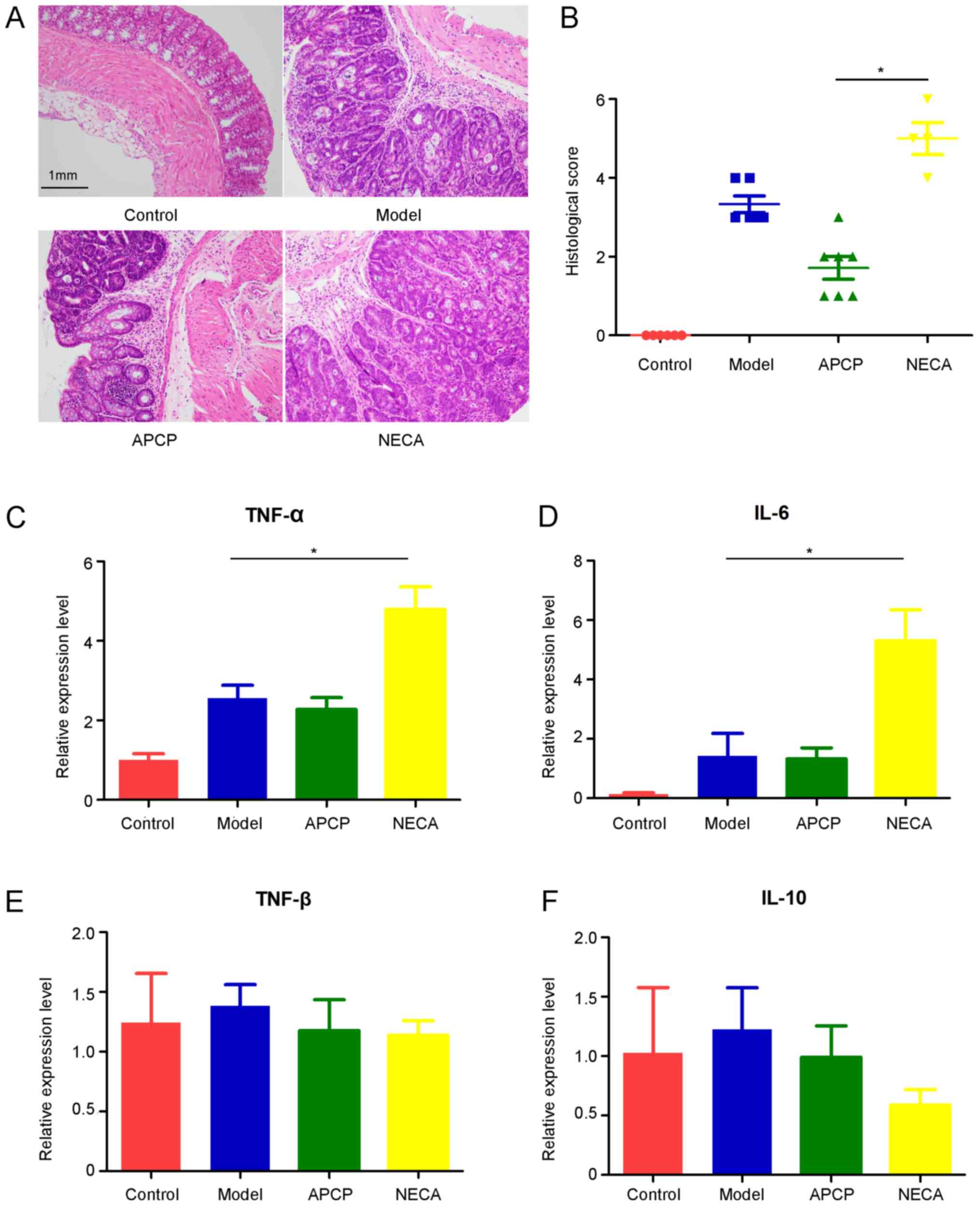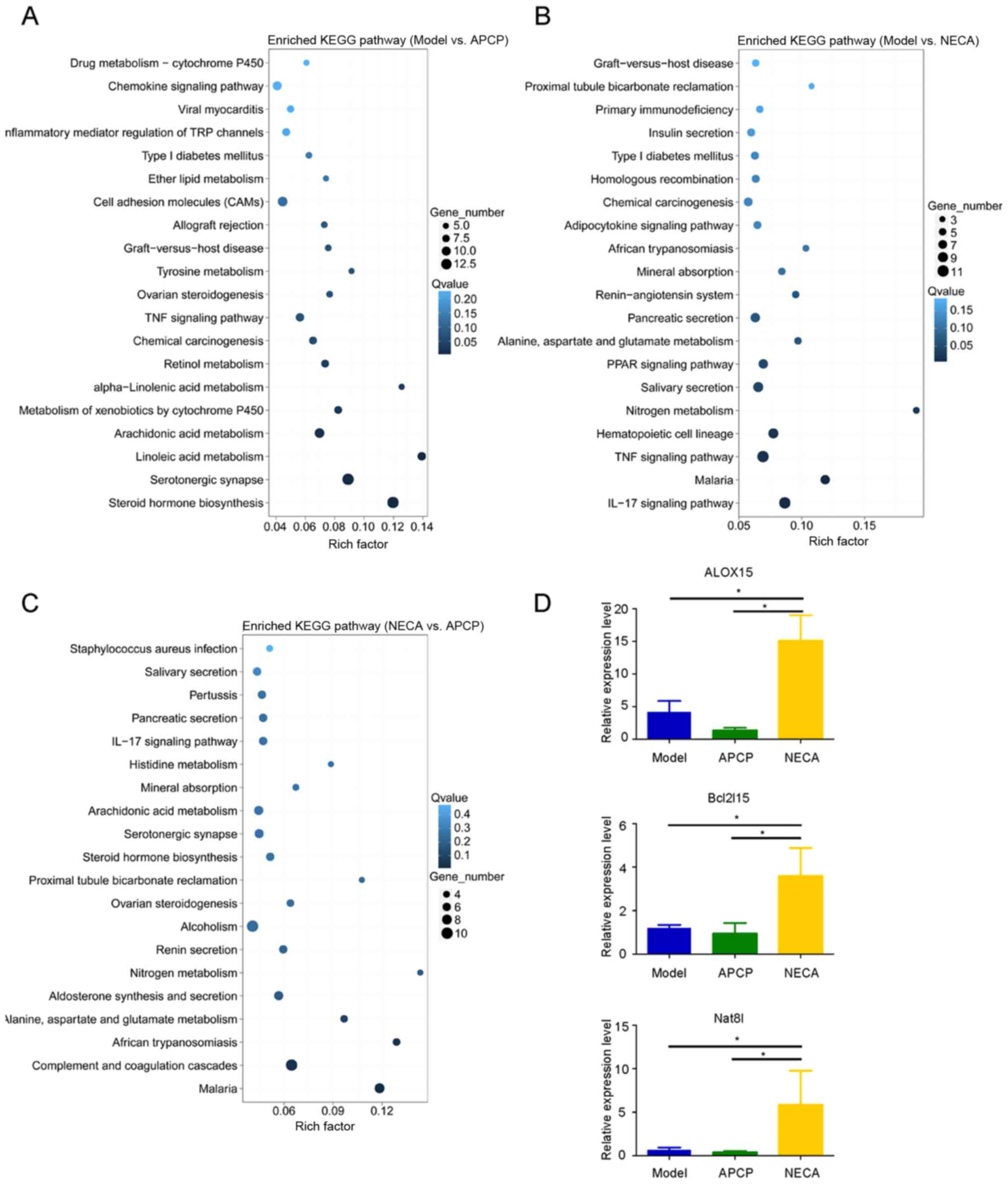|
1
|
Liu TC and Stappenbeck TS: Genetics and
pathogenesis of inflammatory bowel disease. Annu Rev Pathol.
11:127–148. 2016. View Article : Google Scholar : PubMed/NCBI
|
|
2
|
Khor B, Gardet A and Xavier RJ: Genetics
and pathogenesis of inflammatory bowel disease. Nature.
474:307–317. 2011. View Article : Google Scholar : PubMed/NCBI
|
|
3
|
Grivennikov SI, Greten FR and Karin M:
Immunity, inflammation, and cancer. Cell. 140:883–899. 2010.
View Article : Google Scholar : PubMed/NCBI
|
|
4
|
Singh R, Mishra MK and Aggarwal H:
Inflammation, immunity, and cancer. Mediators Inflamm.
2017:60273052017. View Article : Google Scholar : PubMed/NCBI
|
|
5
|
Navaneethan U, Zhu X, Lourdusamy D,
Lourdusamy V, Shen B and Kiran R: Colorectal cancer resection rates
in patients with inflammatory bowel disease: A population-based
study. Gastroenterol Rep (Oxf). 6:263–269. 2018. View Article : Google Scholar : PubMed/NCBI
|
|
6
|
Bopanna S, Ananthakrishnan AN, Kedia S,
Yajnik V and Ahuja V: Risk of colorectal cancer in Asian patients
with ulcerative colitis: A systematic review and meta-analysis.
Lancet Gastroenterol Hepatol. 2:269–276. 2017. View Article : Google Scholar : PubMed/NCBI
|
|
7
|
Lutgens MW, van Oijen MG, van der Heijden
GJ, Vleggaar FP, Siersema PD and Oldenburg B: Declining risk of
colorectal cancer in inflammatory bowel disease: An updated
meta-analysis of population-based cohort studies. Inflamm Bowel
Dis. 19:789–799. 2013. View Article : Google Scholar : PubMed/NCBI
|
|
8
|
Zimmermann H: 5′-Nucleotidase: Molecular
structure and functional aspects. Biochem J. 285((Pt 2)): 345–365.
1992. View Article : Google Scholar : PubMed/NCBI
|
|
9
|
Haskó G and Cronstein BN: Adenosine: An
endogenous regulator of innate immunity. Trends Immunol. 25:33–39.
2004. View Article : Google Scholar : PubMed/NCBI
|
|
10
|
Antonioli L, Yegutkin GG, Pacher P,
Blandizzi C and Haskó G: Anti-CD73 in cancer immunotherapy:
Awakening new opportunities. Trends Cancer. 2:95–109. 2016.
View Article : Google Scholar : PubMed/NCBI
|
|
11
|
Zhang B: CD73: A novel target for cancer
immunotherapy. Cancer Res. 70:6407–6411. 2010. View Article : Google Scholar : PubMed/NCBI
|
|
12
|
Ghalamfarsa G, Kazemi MH, Raoofi Mohseni
S, Masjedi A, Hojjat-Farsangi M, Azizi G, Yousefi M and
Jadidi-Niaragh F: CD73 as a potential opportunity for cancer
immunotherapy. Expert Opin Ther Targets. 23:127–142. 2019.
View Article : Google Scholar : PubMed/NCBI
|
|
13
|
Stagg J, Divisekera U, McLaughlin N,
Sharkey J, Pommey S, Denoyer D, Dwyer KM and Smyth MJ: Anti-CD73
antibody therapy inhibits breast tumor growth and metastasis. Proc
Natl Acad Sci USA. 107:1547–1552. 2010. View Article : Google Scholar : PubMed/NCBI
|
|
14
|
Jin D, Fan J, Wang L, Thompson LF, Liu A,
Daniel BJ, Shin T, Curiel TJ and Zhang B: CD73 on tumor cells
impairs antitumor T-cell responses: A novel mechanism of
tumor-induced immune suppression. Cancer Res. 70:2245–2255. 2010.
View Article : Google Scholar : PubMed/NCBI
|
|
15
|
Stagg J, Divisekera U, Duret H, Sparwasser
T, Teng MW, Darcy PK and Smyth MJ: CD73-deficient mice have
increased antitumor immunity and are resistant to experimental
metastasis. Cancer Res. 71:2892–2900. 2011. View Article : Google Scholar : PubMed/NCBI
|
|
16
|
Wang L, Fan J, Thompson LF, Zhang Y, Shin
T, Curiel TJ and Zhang B: CD73 has distinct roles in
nonhematopoietic and hematopoietic cells to promote tumor growth in
mice. J Clin Invest. 121:2371–2382. 2011. View Article : Google Scholar : PubMed/NCBI
|
|
17
|
Kaku H, Cheng KF, Al-Abed Y and Rothstein
TL: A novel mechanism of B cell-mediated immune suppression through
CD73 expression and adenosine production. J Immunol. 193:5904–5913.
2014. View Article : Google Scholar : PubMed/NCBI
|
|
18
|
Grenz A, Zhang H, Eckle T, Mittelbronn M,
Wehrmann M, Köhle C, Kloor D, Thompson LF, Osswald H and Eltzschig
HK: Protective role of ecto-5′-nucleotidase (CD73) in renal
ischemia. J Am Soc Nephrol. 18:833–845. 2007. View Article : Google Scholar : PubMed/NCBI
|
|
19
|
Eckle T, Krahn T, Grenz A, Köhler D,
Mittelbronn M, Ledent C, Jacobson MA, Osswald H, Thompson LF,
Unertl K and Eltzschig HK: Cardioprotection by ecto-5′-nucleotidase
(CD73) and A2B adenosine receptors. Circulation. 115:1581–1590.
2007. View Article : Google Scholar : PubMed/NCBI
|
|
20
|
Mahamed DA, Toussaint LE and Bynoe MS:
CD73-generated adenosine is critical for immune regulation during
Toxoplasma gondii infection. Infect Immun. 83:721–729. 2015.
View Article : Google Scholar : PubMed/NCBI
|
|
21
|
Ray MA, Johnston NA, Verhulst S, Trammell
RA and Toth LA: Identification of markers for imminent death in
mice used in longevity and aging research. J Am Assoc Lab Anim Sci.
49:282–288. 2010.PubMed/NCBI
|
|
22
|
Yang X, Zhang F, Wang Y, Cai M, Wang Q,
Guo Q, Li Z and Hu R: Oroxylin A inhibits colitis-associated
carcinogenesis through modulating the IL-6/STAT3 signaling pathway.
Inflamm Bowel Dis. 19:1990–2000. 2013.PubMed/NCBI
|
|
23
|
Livak KJ and Schmittgen TD: Analysis of
relative gene expression data using real-time quantitative PCR and
the 2(-Delta Delta C(T)) method. Methods. 25:402–408. 2001.
View Article : Google Scholar : PubMed/NCBI
|
|
24
|
Kleinstein SE, Heath L, Makar KW, Poole
EM, Seufert BL, Slattery ML, Xiao L, Duggan DJ, Hsu L, Curtin K, et
al: Genetic variation in the lipoxygenase pathway and risk of
colorectal neoplasia. Genes Chromosomes Cancer. 52:437–449. 2013.
View Article : Google Scholar : PubMed/NCBI
|
|
25
|
Xiao R, Li C and Chai B: miRNA-144
suppresses proliferation and migration of colorectal cancer cells
through GSPT1. Biomed Pharmacother. 74:138–144. 2015. View Article : Google Scholar : PubMed/NCBI
|
|
26
|
Zand B, Previs RA, Zacharias NM,
Rupaimoole R, Mitamura T, Nagaraja AS, Guindani M, Dalton HJ, Yang
L, Baddour J, et al: Role of increased n-acetylaspartate levels in
cancer. J Natl Cancer Inst. 108:djv4262016. View Article : Google Scholar : PubMed/NCBI
|
|
27
|
Torres J, Mehandru S, Colombel JF and
Peyrin-Biroulet L: Crohn's disease. Lancet. 389:1741–1755. 2017.
View Article : Google Scholar : PubMed/NCBI
|
|
28
|
Ungaro R, Mehandru S, Allen PB,
Peyrin-Biroulet L and Colombel JF: Ulcerative colitis. Lancet.
389:1756–1770. 2017. View Article : Google Scholar : PubMed/NCBI
|
|
29
|
Farraye FA, Odze RD, Eaden J and Itzkowitz
SH: AGA technical review on the diagnosis and management of
colorectal neoplasia in inflammatory bowel disease.
Gastroenterology. 138:746–774, 774.e1-4; quiz e12-13. 2010.
View Article : Google Scholar : PubMed/NCBI
|
|
30
|
Askling J, Dickman PW, Karlén P, Broström
O, Lapidus A, Löfberg R and Ekbom A: Colorectal cancer rates among
first-degree relatives of patients with inflammatory bowel disease:
A population-based cohort study. Lancet. 357:262–266. 2001.
View Article : Google Scholar : PubMed/NCBI
|
|
31
|
Fumery M, Dulai PS, Gupta S, Prokop LJ,
Ramamoorthy S, Sandborn WJ and Singh S: Incidence, risk factors,
and outcomes of colorectal cancer in patients with ulcerative
colitis with low-grade dysplasia: A systematic review and
meta-analysis. Clin Gastroenterol Hepatol. 15:665–674.e5. 2017.
View Article : Google Scholar : PubMed/NCBI
|
|
32
|
Gyde SN, Prior P, Allan RN, Stevens A,
Jewell DP, Truelove SC, Lofberg R, Brostrom O and Hellers G:
Colorectal cancer in ulcerative colitis: A cohort study of primary
referrals from three centres. Gut. 29:206–217. 1988. View Article : Google Scholar : PubMed/NCBI
|
|
33
|
Munkholm P, Langholz E, Davidsen M and
Binder V: Intestinal cancer risk and mortality in patients with
Crohn's disease. Gastroenterology. 105:1716–1723. 1993. View Article : Google Scholar : PubMed/NCBI
|
|
34
|
Rogler G: Chronic ulcerative colitis and
colorectal cancer. Cancer Lett. 345:235–241. 2014. View Article : Google Scholar : PubMed/NCBI
|
|
35
|
Popivanova BK, Kitamura K, Wu Y, Kondo T,
Kagaya T, Kaneko S, Oshima M, Fujii C and Mukaida N: Blocking
TNF-alpha in mice reduces colorectal carcinogenesis associated with
chronic colitis. J Clin Invest. 118:560–570. 2008.PubMed/NCBI
|
|
36
|
Azer SA: Overview of molecular pathways in
inflammatory bowel disease associated with colorectal cancer
development. Eur J Gastroenterol Hepatol. 25:271–281. 2013.
View Article : Google Scholar : PubMed/NCBI
|
|
37
|
Taniguchi K and Karin M: IL-6 and related
cytokines as the critical lynchpins between inflammation and
cancer. Semin Immunol. 26:54–74. 2014. View Article : Google Scholar : PubMed/NCBI
|
|
38
|
Regateiro FS, Cobbold SP and Waldmann H:
CD73 and adenosine generation in the creation of regulatory
microenvironments. Clin Exp Immunol. 171:1–7. 2013. View Article : Google Scholar : PubMed/NCBI
|
|
39
|
Alam MS, Kuo JL, Ernst PB, Derr-Castillo
V, Pereira M, Gaines D, Costales M, Bigley E and Williams K:
Ecto-5′-nucleotidase (CD73) regulates host inflammatory responses
and exacerbates murine salmonellosis. Sci Rep. 4:44862014.
View Article : Google Scholar : PubMed/NCBI
|
|
40
|
Doherty GA, Bai A, Hanidziar D, Longhi MS,
Lawlor GO, Putheti P, Csizmadia E, Nowak M, Cheifetz AS, Moss AC
and Robson SC: CD73 is a phenotypic marker of effector memory Th17
cells in inflammatory bowel disease. Eur J Immunol. 42:3062–3072.
2012. View Article : Google Scholar : PubMed/NCBI
|
|
41
|
Forte G, Sorrentino R, Montinaro A,
Luciano A, Adcock IM, Maiolino P, Arra C, Cicala C, Pinto A and
Morello S: Inhibition of CD73 improves B cell-mediated anti-tumor
immunity in a mouse model of melanoma. J Immunol. 189:2226–2233.
2012. View Article : Google Scholar : PubMed/NCBI
|
|
42
|
Zhu Y, Gu L, Li Y, Lin X, Shen H, Cui K,
Chen L, Zhou F, Zhao Q, Zhang J, et al: miR-148a inhibits colitis
and colitis-associated tumorigenesis in mice. Cell Death Differ.
24:2199–2209. 2017. View Article : Google Scholar : PubMed/NCBI
|
|
43
|
Odashima M, Bamias G, Rivera-Nieves J,
Linden J, Nast CC, Moskaluk CA, Marini M, Sugawara K, Kozaiwa K,
Otaka M, et al: Activation of A2A adenosine receptor attenuates
intestinal inflammation in animal models of inflammatory bowel
disease. Gastroenterology. 129:26–33. 2005. View Article : Google Scholar : PubMed/NCBI
|
|
44
|
Sotnikov I and Louis NA: CD73-dependent
regulation of interferon alphaA and interleukin-10 in the inflamed
mucosa. ScientificWorldJournal. 10:2167–2180. 2010. View Article : Google Scholar : PubMed/NCBI
|
|
45
|
Mantzaris GJ: Previous cancer and/or
lymphoma in patients with refractory IBD-con: Anti-TNF or
conventional immunosuppressive treatment. Dig Dis. 32 (Suppl
1):S122–S127. 2014. View Article : Google Scholar
|
|
46
|
Bandzar S, Gupta S and Platt MO: Crohn's
disease: A review of treatment options and current research. Cell
Immunol. 286:45–52. 2013. View Article : Google Scholar : PubMed/NCBI
|
|
47
|
Yu H, Lee H, Herrmann A, Buettner R and
Jove R: Revisiting STAT3 signalling in cancer: New and unexpected
biological functions. Nat Rev Cancer. 14:736–746. 2014. View Article : Google Scholar : PubMed/NCBI
|
|
48
|
Namgaladze D, Snodgrass RG, Angioni C,
Grossmann N, Dehne N, Geisslinger G and Brüne B: AMP-activated
protein kinase suppresses arachidonate 15-lipoxygenase expression
in interleukin 4-polarized human macrophages. J Biol Chem.
290:24484–24494. 2015. View Article : Google Scholar : PubMed/NCBI
|


















